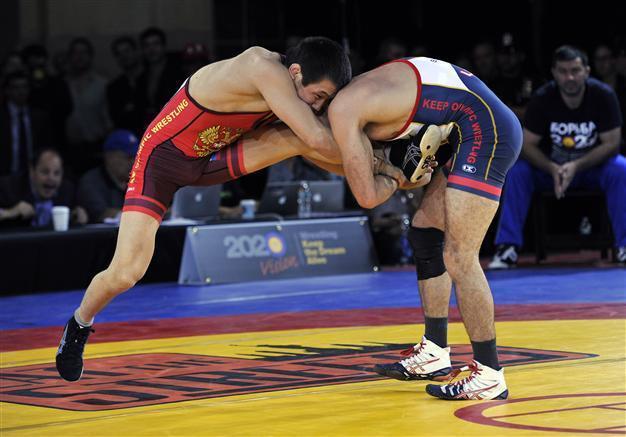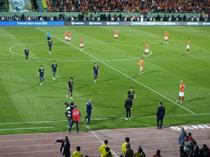US, Iran, Russia unite for wrestling
NEW YORK - Agence France-Presse

Coleman Scott (R) of the US and Artas Sanaa of Russia wrestle in the 60kg class during "Rumble on the Rails," a wrestling exhibition, at Grand Central Station in New York May 15, 2013. AFP photo
Call it peace through fighting, but wrestlers from the United States, Iran and Russia provided New York with an unusual vision of international harmony when they took to the mat on May 15.The top-level sportsmen, grappling in an ornate side hall of Grand Central rail station in Manhattan, met as part of a campaign to persuade the International Olympic Committee to go back on its shock decision to scrap wrestling after the 2016 Rio de Janeiro Games.
By setting up the “Rumble on the Rails” in Grand Central’s Vanderbilt Hall at rush hour, organizers hoped to demonstrate that the sport, written off by Olympic leaders as too obscure, belongs right in the middle of things.
But there was a broader message from the three-nation bout: wrestling’s strong men can also show the world how to get along.
“We have Russia, Iran and the United States on the same page, with a united front,” an announcer declared triumphantly during a pause in bouts between top-flight Iranian and American wrestlers.
The antagonism between Washington and Tehran over Iran’s nuclear program and persistent US-Russian tensions -- resurfacing this week in Moscow’s claim to have caught a wig-wearing CIA spy -- were far away.
On the mats, the fighters pulled and threw each other about, but they embraced warmly between fights, while in the stands a fervent Iranian fan contingent more than held its own against opposing chants of “USA, USA!”
“I think for the average American it’s eye-opening. You realize there’s very little difference between us,” said surgeon and one-time college wrestler Michael Deehan, 50. “But I hope our wrestlers win,” he added quickly.
The wrestlers’ main worry, of course, was not world peace, but survival of their sport’s Olympic status.
Ironically, wrestling was one of the very few sports played by ancient Greeks in the original Olympics, long before the likes of synchronized swimming or BMX cycle-racing came about.
The IOC declared in February that it wanted the sport ejected, apparently because it might be too macho, or complicated, or untelegenic.
But after initial hunger strikes by coaches and Olympic champions sending back their medals in protest, wrestling is fighting back.
Leaders of the international wrestling federation, FILA, are considering introduction of new outfits for competitors and streamlined rules to broaden the appeal, but admit they face an uphill battle. The full IOC will give its decision September.
Will O’Connell, a New York bank analyst with an Iranian fiancee, said he was impressed that the United States was standing shoulder to shoulder with Iran on the matter.
“It’s a big help to Iran because this sport is one of the only ways they win Olympic medals, so it’s one of their main ways to get out into the international community,” O’Connell said.
Leila Irani, a 36-year-old Iranian woman working as a designer in New York, suggested that politicians should be in the audience.
“During the matches you saw how respectful they were with each other, winner and loser,” she said of the cauliflower-eared competitors. “I think people have no problems -- only politicians.”
















